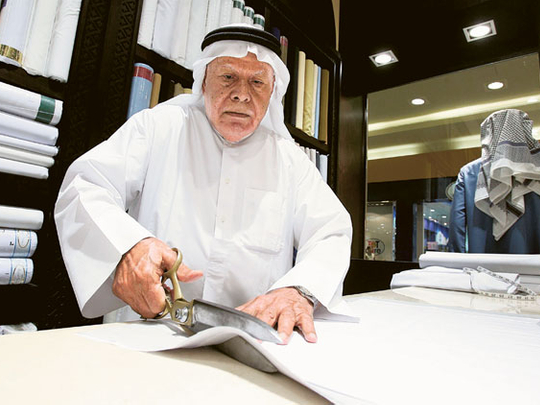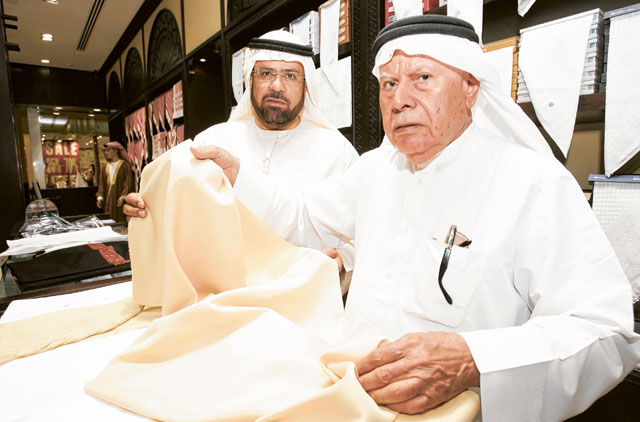
Dubai: Couturier to royalty, Shaikh Abdul Rahman Al Madani has been making kandouras for Dubai's ruling family and the emirate's elite from the time of the late Shaikh Saeed Bin Maktoum Al Maktoum, grandfather of His Highness Shaikh Mohammad Bin Rashid Al Maktoum, Vice-President and Prime Minister of the UAE and Ruler of Dubai.
And today, after decades of hard work and the lonely pursuit of perfection in his chosen vocation, for anyone who wants to look fashionable in a traditional kandoura, Al Madani is the definitive name to go to.
From humble beginnings, which can be traced back to the UAE's infancy itself, he has certainly cut a fine swathe in his profession, with the exalted title of "Royal Tailor" bestowed on him for his dedication to and development of his traditional craft. The Al Madani name may now stand for premium traditional menswear, but it hasn't been an entirely seamless journey for the maestro.
"It is a very tough job which ruins your body and eyesight. I used to work non-stop from dawn until dusk at a time when there was no electricity," Al Madani said. "On the eve of one particular Eid, to meet a huge order, I sewed all night using just kerosene lamps."
All those years of sacrifice have borne fruit. These days, Al Madani is the tailor by appointment to members of Dubai's ruling family. He has bespoke designs for them and while most of them prefer the Arabic kandoura, he has a Hamdani design for Shaikh Hamdan Bin Mohammad Bin Rashid Al Maktoum, Crown Prince of Dubai.
Al Madani's journey started early in his life. It was when he turned 15 and finished "Katatib", the Quran school, that he chose tailoring as his craft by joining his uncle's shop in Dubai. The shop is still very much in existence today and is rented from Shaikh Saeed Al Maktoum's family. More than five decades ago the shop's rent was Rs5 a month, back when the UAE was still the Trucial States and the currency of India was in use here.
Costume cutting
Al Madani started by stitching diving costumes at a time when Dubai's economy still relied on the pearl trade. He also recalls another practice of the 1960s, when a tailor would not cut the master design of a kandoura, which instead came directly from the women of the client's home. Another memory he holds dear is of the late ruler Shaikh Rashid Bin Saeed Al Maktoum who always passed by his shop en route to the souq at Al Ras, which was the centre of the nascent trade in the emirate.
Al Madani's business acumen came to the fore when he set up his own tailoring shop — National Tailors — in Deira, where he made as many as three kandouras a day for a rupee apiece. It was there that he started to incorporate several of his trademark design elements into a kandoura.
But in those years of scarcity and hardship, Al Madani found himself in a situation where he had to travel with his wares to sell them. With a view to improving his finances, he made trips to Dammam in Saudi Arabia. All of 25, he set off for the Saudi port city, taking 400 readymade kandouras to sell for ten Saudi riyals apiece.
"It was a transformational step in my career, as I returned to Dubai after two months with 3,000 riyals — a fortune at that time — to expand my business," he reminisced.
Al Madani still remembers his first Singer sewing machine and the subsequent ones sold to him by visitors in the 1950s before oil was discovered in Dubai. "I started my business when there was nothing in Dubai," he said.
A career that was starting to bloom allowed Al Madani to move into a villa in Rashidiya. But he can stretch his memory back to a time when the 14 members of his family were staying in a tent in Al Sabkha, an old neighbourhood in Deira. "All of our lives have changed drastically," he said. "After all the hard work, the whole emirates is enjoying luxury."
Al Madani's business has also assumed a stature quite unthinkable when he started. It now extends to more than 30 shops across the UAE, employing over 300 and making more than 1,000 kandouras a month. "We were the first to have tailoring shops in shopping centres in 1992," he said.
Exact measures
And the association with the ruling family continues. While he used to tailor 50 kandouras for Shaikh Rashid each year, he does 1,000 for the ruling family now.
"They know my clothes from those made by others when they wear it," Al Madani said. "They never complain. I know the exact measures and what they prefer."
He still remembers Shaikh Rashid's preference for white and the length of his kandoura — 60 inches.
Most of Al Madani's master cutters come from India and Pakistan. "I taught them how to cut initially, and they have a clear idea about the Gulf costumes — better than others in the region."
But for all of Al Madani's obvious achievements, the father of eight and grandfather to 40 does not want to bequeath his profession to the next generation. He said 40 years ago tailoring was the profession of illiterate people and he intended to educate all his children rather than get them into his profession which he describes as painful.
His eldest son, Mohammad Al Madani, said his father never allowed him to touch fabrics or even think of becoming a tailor.
"I had talent and a passion for tailoring, but father never allowed me to work with him. I only used to watch him stitch." Mohammad said. "He always insisted on educating me and my sisters and brothers."
Today, the Al Madani name has gone well beyond kandouras and into fashion, food and construction. Mohammad, a US-trained petroleum engineer who resigned from Dubai Petroleum Company in 2000, now runs the Abdul Rahman Al Madani Group (AMG) which has over 100 outlets in the UAE and the Gulf.
As to what lessons he has picked up from the patriarch, Mohammad said: "He doesn't know what retirement means. His dedication and faithfulness to work and putting customers first are part of his work ethic.
For Shaikh Abdul Rahman Al Madani, that's aligning craft with skill and dedication, thus leaving an indelible imprint in the UAE's history and social fabric.













